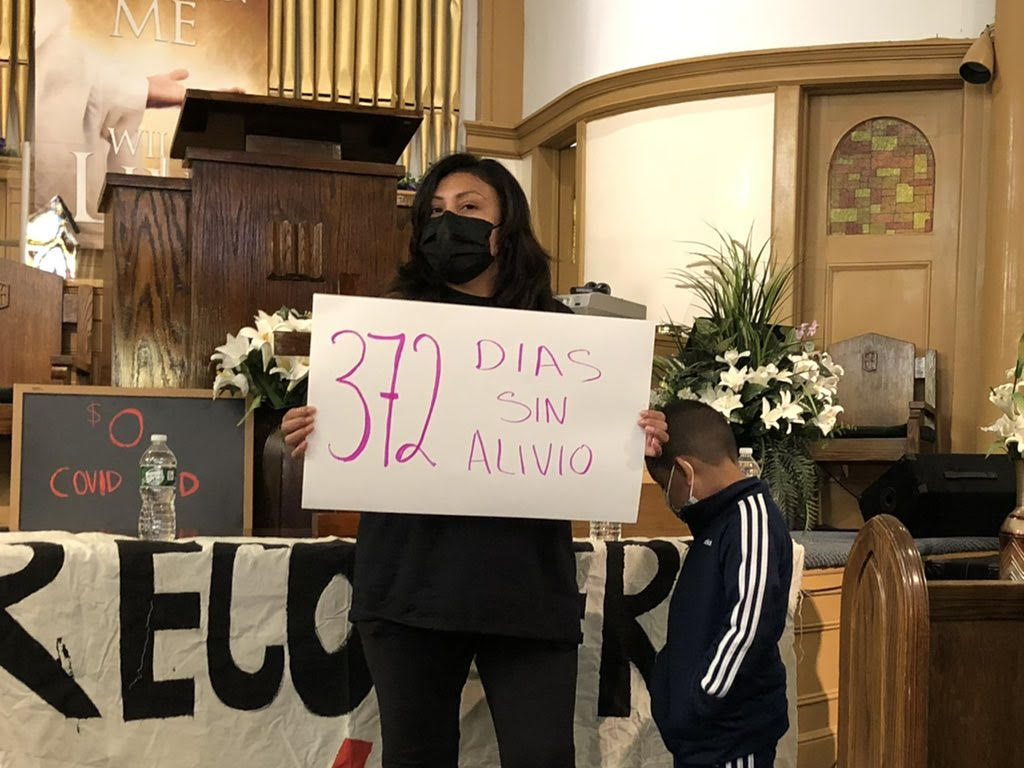
New Jersey undocumented workers hunger strike for COVID benefits after similar movement in New York
Governor Phil Murphy’s office has yet to come to the table with an adequate solution as the strike hits its tenth day.
Margarita Rodriguez was unemployed for months last year after she, along with many other undocumented workers, lost their job in the economic fallout of the coronavirus pandemic.
She has since been able to find a position in the food industry, risking her life as an essential worker in a deli, to provide for her three children. But due to her status, she hasn’t received a dime from the federal government’s COVID-19 relief bills.
This has been the case for the majority of undocumented workers, many of whom have been keeping the nation afloat as it struggled through the pandemic.
In February, California passed some relief in the form of $600 one-time payments for tax-paying undocumented workers.
Undocumented workers in New York also reached an important victory with the help of Make the Road NY and the Fund Excluded Workers Coalition, granting them financial relief from a year they endured without income.
There are more than 5 million undocumented essential workers who pay taxes but were cut out of federal relief.
— Julián Castro (@JulianCastro) April 11, 2021
NY’s excluded worker fund will support the workers who cared for our health, kept us fed, and kept our economy running this past year. Good job! https://t.co/c5UcOgA8WP
The fight lasted a year and ended with a 23-day hunger strike. Eventually, the New York legislature and Gov. Andrew Cuomo agreed upon a $2.1 billion fund for undocumented workers who were excluded from stimulus packages.
In its neighboring state of New Jersey, Rodriguez, along with over 30 other undocumented workers in the state, have been carrying out a hunger strike of their own.
Undocumented workers going into a week of hunger strike asking for stimulus payments in New Jersey. People putting their bodies on the line. If you’re from New Jersey, watch this story.
— Maria Hinojosa (@Maria_Hinojosa) April 15, 2021
For 10 days now, this group of workers have been on a hunger strike, demanding that the state provide COVID-19 relief funds to excluded workers.
“We are contributing our labor, our money to the state — it’s unfair that they leave us out of the stimulus,” said Rodriguez, 40, noting that she and other undocumented workers pay taxes.
The mother of three then transitioned into Spanish, insisting that as essential workers, they are very exposed to the deadly virus, interacting with people every day.
12 union groups in NJ now joining calls to demand @GovMurphy + lawmakers provide relief for undocumented immigrants as 35 workers are now on the 10th day of a hunger strike.
— Karen Yi (@karen_yi) April 16, 2021
Listen to one hunger striker's story here: https://t.co/Bb0O0nzNUh@MaketheRoadNJ https://t.co/RybsKXE4KS
“We are at risk,” Rodriguez said.
Despite the important role that immigrants have played during this pandemic, working on the frontline as essential workers in industries such as food, childcare, healthcare, construction and transportation, undocumented people have been left out of all three federal stimulus payments.
Organizers from the immigrants rights group Make the Road New Jersey have been urging the state to provide weekly unemployment payments of $600 to undocumented workers who lost their job. They are also requesting one-time payments of $2,000 to those who were left out of the federal stimulus packages.
RELATED CONTENT
New Jersey Gov. Phil Murphy told HuffPost that his administration is “exploring ways to further assist members of our immigrant community during this challenging time,” but stopped short of providing details on whether or how much direct relief the state would distribute.
Earlier this week, Murphy’s office reportedly proposed a commitment of about $40 million to a relief fund during a call with organizers. This is far less than what workers have been requesting for the state’s nearly 500,000 undocumented immigrants.
But Katy Sastre, campaign strategist with the Immigrant Alliance for Justice, who was on the call, described the idea as “insulting.”
209,400 undocumented immigrants in New Jersey are essential workers. Our state quarantined on the back of essential workers. We deserve citizenship and COVID relief NOW.
— Wind of the Spirit (@WindofSpiritNJ) February 25, 2021
Take Action:
https://t.co/mokVaY1SoR
https://t.co/n8j6VGkYiI
“This is completely insufficient. It’s insulting to our communities who have accrued thousands of dollars worth of debt,” said Sastre. “It comes out to $96 each person. That won’t even pay a phone bill.”
This also won’t be enough to end the hunger strike by the 34 undocumented immigrants and allies.
According to the three other people on the call, they concluded that the relief fund mentioned by the governor’s office doesn’t appear to be anything more than an idea.
As the virus’s death toll passes 565,000 in the U.S., Latinx and Black people have been almost three times as likely to be hospitalized with COVID-19 as white people have, and twice as likely to die.
“Keep raising your voice,” Rodriguez said to her fellow undocumented workers. “Enough of staying silent. As immigrant workers, we also count.”











LEAVE A COMMENT: